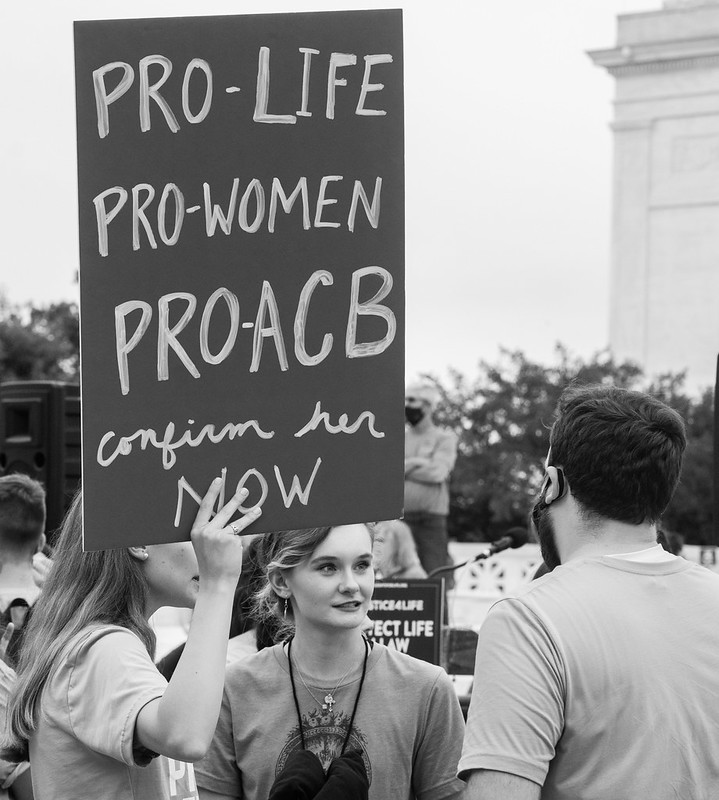
Trump nominates a pro-life woman to the US Supreme Court
But don’t expect a quick reversal of Roe v Wade even if she is confirmed
At the Supreme Court after the announcement of the nomination of Amy Coney Barrett / flickr / Victoria Pickering
As expected, President Trump has nominated Judge Amy Coney Barrett to fill the vacancy on the US Supreme Court left by the recent death of Ruth Bader Ginsburg. Her nomination is unusual in many ways.
If Judge Barrett is confirmed by the Senate as the ninth Supreme Court Justice, she would be one of the youngest ever to serve – and more importantly, she can be expected to be on the court for decades, as American justices serve for life. A mother of seven, including two adopted children and one with Down syndrome, she would be the first to join the bench with school-aged children.
Trump’s selection is deeply political. A core promise to his supporters is filling the bench with conservative judges who will, amongst other things, overturn the 1973 ruling of Roe v Wade. No justice has ever been nominated so close to a presidential election and Democrats and some Republicans feel that appointing Ginsburg’s replacement should be the prerogative of the winner of November’s election. But keeping his promise might give Trump another four years in the White House.
Few pundits question the quality of Judge Barrett’s intellect. But she would be a judicial conservative replacing an outspoken liberal. Although no one can predict how justices will vote after their nomination, she describes herself as a disciple of the late Justice Antonin Scalia, for whom she worked as a clerk. “His judicial philosophy is mine, too. A judge must apply the law as written. Judges are not policymakers, and they must be resolute in setting aside any policy views they might hold.”
Although the Supreme Court rules on an almost infinite variety of cases, from fishing rights to voting rights, one issue overshadows all the others at the moment – whether Judge Barrett will vote to overturn Roe v Wade.
Judge Barrett has been described everywhere as “a devout Catholic” with pro-life views. However, her vote would not necessarily bring about a quick reversal of Roe v Wade.
In 2013, Barrett said, “I think it is very unlikely at this point that the court is going to overturn Roe, or Roe [v. as curbed by [Planned Parenthood v.] Casey. The fundamental element, that the woman has a right to choose abortion, will probably stand.” It may depend on how closely she and fellow conservatives on the court will hew to the doctrine of stare decisis, of deciding cases on precedent.
The path to overturning Roe v Wade, if there is one, will involve constitutional issues which seem abstruse to the layman. In fact, Justice Ginsburg, a strong supporter of “a woman’s right to choose” was not impressed by the jurisprudence of Roe v. Wade, according to legal scholars, which was based on the implied right to privacy. She believed that a firmer basis was a right to gender equality.
Michael Cook is editor of BioEdge
Creative commons
https://www.bioedge.org/images/2008images/50387709342_2ac3faaeed_c.jpg
roe v. wade
us supreme court
- How long can you put off seeing the doctor because of lockdowns? - December 3, 2021
- House of Lords debates assisted suicide—again - October 28, 2021
- Spanish government tries to restrict conscientious objection - October 28, 2021
